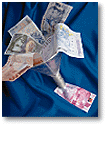 About F&D Subscribe Back Issues Write Us Copyright Information Use the free Adobe Acrobat Reader to view a pdf file of this article
|
Letter from the editor
January 1, 1999 will mark a historic moment in international monetary cooperation as the European Economic and Monetary Union (EMU), an area with an economy equal to that of the United States, is born. On that date, 11 of the European Union's 15 member countries will lock their exchange rates; the common currency, the euro, will come into being; and national authorities will hand over the responsibility for monetary and exchange rate policies to area-wide institutions. Several articles in this issue of Finance & Development consider the wider significance of this epochal event. In the first, Michael C. Deppler discusses the implications of EMU for the IMF's surveillance activities. Some of the major policy challenges facing the euro area in maintaining growth and curbing unemployment are examined by Klaas Knot, Donogh McDonald, and Karen Swiderski. The impact of EMU on the other economies of Western Europe and on other countries is analyzed by John Green and Phillip L. Swagel, while Alessandro Prati and Garry J. Schinasi address the issue of ensuring financial stability within EMU. One of the most striking developments of recent years has been the growth of international financial transactions and international capital flows. This has brought substantial benefits, but it is not without risk. In their article, Barry Eichengreen and Michael Mussa emphasize that capital account and financial liberalization are inevitable for countries that wish to participate in the open global economy and discuss ways in which this process can best be managed. Some of the key issues in capital account liberalization are examined by R. Barry Johnston, while Saleh M. Nsouli and Mounir Rached look at the steps that need to be taken by the Southern Mediterranean countries in opening their capital account. Since 1982, a series of financial crises have hit emerging markets, most recently the crisis in East Asia. Donald J. Mathieson, Anthony Richards, and Sunil Sharma discuss how emerging markets can better manage the risks associated with integration into the international monetary system, while Daniel C. Hardy considers how to predict banking crises. The development of monetary policy instruments in Russia and some of the lessons that have been learned in the process are discussed by Tom�s J.T. Bali�o. Charles Enoch and Anne-Marie Gulde take a look at the success countries have had with currency boards and the circumstances in which such monetary arrangements are most likely to be effective. And Harold James, Professor of Modern History at Princeton University, takes a fresh look at the evolution of IMF conditionality over the years and some of the new challenges faced in this area. Ian S. McDonald
|